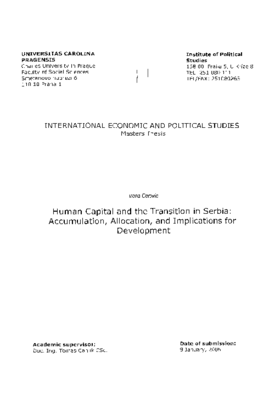Human capital and the transition in Serbia : accumulation, allocation and implications for development
Human Capital and the Transition in Serbia: Accumulation, Allocation and Implications for Development
diplomová práce (OBHÁJENO)

Zobrazit/
Trvalý odkaz
http://hdl.handle.net/20.500.11956/2956Identifikátory
SIS: 1536
Katalog UK: 990004003930106986
Kolekce
- Kvalifikační práce [19704]
Autor
Vedoucí práce
Oponent práce
Janda, Karel
Fakulta / součást
Fakulta sociálních věd
Obor
Mezinárodní ekonomická a politická studia
Katedra / ústav / klinika
Katedra politologie
Datum obhajoby
10. 2. 2006
Nakladatel
Univerzita Karlova, Fakulta sociálních vědJazyk
Angličtina
Známka
Výborně
Developed industrial economies have faced challenging transformations over the past decade, stemming from the increased global interdependence of economic systems and greater reliance on rapidly changing technology. Along with the reassessment of the bases of modern society came the realization that human knowledge and ability to learn have become a key asset for development and growth. As developed economies reform to adapt to this new reality, they are joined by post-communist countries facing added challenges of political and economic adjustments. This study looks at the paths open to the country that was among the last to enter this process in Europe. Serbia's current situation with respect to human capital is assessed and examined in light of the global processes taking place around it, and its unique challenges are presented. The conceptual approach of the study involves looking at Serbia's human resources in terms of their quality, quantity, and distribution between sectors of differing productivity. This is done through a survey of educational reforms, skilled emigration, and forces determining the allocation of human capital. The study shows that there is a need to adopt an integrated strategic vision of human development as a vital component for the success of the transition. It presents this goal...
